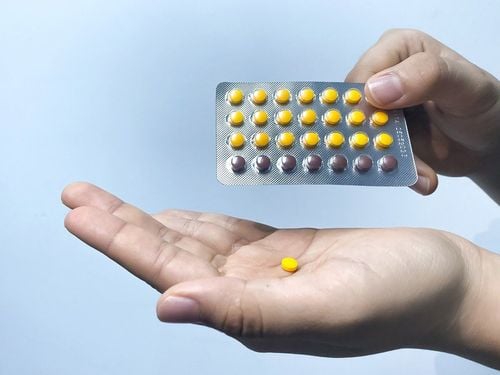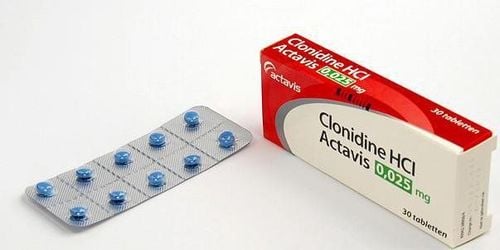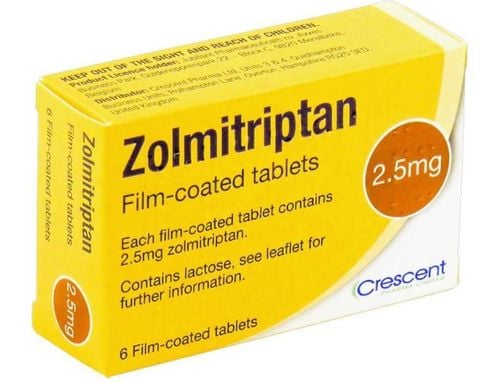This is an automatically translated article.
Shakes drug is indicated in the treatment of major depressive disorder in adults... Let's learn about the uses, the notes when using the Shakes drug through the article below.
1. Uses of Shakes
"What are Shakes?". Shakes contains the active ingredient Mirtazapine 30mg in the form of film-coated tablets. The active ingredient Mirtazapine belongs to a quadricyclic antidepressant derivative, acting by inhibiting the reuptake of Noradrenalin and Serotoin into the central nervous system. From there to help patients improve mood, reduce sadness, treat depression, sensory disturbances, motor inhibition, behavior incontinence, sleep disorders ...
Shakes are indicated in the treatment of major depressive disorder in adults.
2. Dosage of Shakes
Shakes belong to the group of prescription drugs, the dose of medicine used is prescribed by the treating doctor based on the patient's condition.
Some recommendations on dosage of Shakes in adults are as follows:
Starting dose: Take 15mg/day at bedtime; Maintenance dose: Take 15 - 45mg / time / day before going to bed; The maximum dose should not exceed 45mg/day. Shakes reach the maximum effect after 2-4 weeks of treatment, so patients absolutely do not change the dose or stop taking the drug suddenly, because it increases the risk of unwanted effects.
In order to be effective in the treatment process, the patient should note a number of issues as follows:
The drug can be taken before or after a meal; It is best to take the medicine once a day, before going to bed to avoid forgetting; Take the medicine with a sufficient amount of water, do not chew or break the tablet; Do not drink alcohol during treatment with Shakes.
3. Undesirable effects of the drug Shakes
Shakes can cause some unwanted effects as follows:
Common: Headache, dizziness, drowsiness, dry mouth, nausea, constipation, increased appetite, weight gain, confusion , negative thoughts, nightmares, muscle pain, back pain, shortness of breath; Uncommon: Memory impairment, lethargy, vomiting, abdominal pain, diarrhea, anxiety, agitation, insomnia, convulsions, myasthenia gravis, sinusitis, cough, difficulty urinating, urinary retention, rash , itching, redness; Rare: Movement disorder, extrapyramidal syndrome, syncope, stomatitis, colitis, angina pectoris, cardiac arrhythmia. Patients need to inform the doctor to treat unwanted symptoms encountered during treatment with Shakes.
4. Note when using Shakes
4.1. Contraindications Contraindicated to use Shakes drug in the following cases:
Patients with hypersensitivity to Mirtazapine or any component of Shakes drug; Patients treated with MAO inhibitors such as Linezolid, Isocarboxazid... in the past 14 days; The patient is being treated with the drug Tryptophan; The patient has suicidal thoughts; Children under 18. Some conditions that require caution when taking Shakes and need to be monitored by a doctor include epilepsy, glaucoma, convulsions, bipolar disorder, mood swings, risk of stroke, high blood fat. , low blood pressure, patients with kidney failure, liver failure.
4.2. Use with caution For pregnant women: Mirtazapine is classified as a Class C by the FDA for the level of danger when used in pregnant women. This means that the drug poses a potential danger to both the fetus and the mother. Therefore, the use of this drug in this population needs to be carefully weighed against the benefits and risks.
For women who are breast-feeding: Studies have shown that Mirtazapine is excreted in breast milk and has the potential to cause harm to an unborn baby. Therefore, it is not recommended to use Shakes in lactating women.
For drivers, operating machinery: Shakes have the ability to cause sleep, sedation, side effects of dizziness, muscle tremors, tremors... Therefore, avoid using Shakes in drivers, operating machinery. .
Store Shakes at room temperature below 30 degrees Celsius, away from direct sunlight and high humidity.
5. Shakes drug interactions
Shakes may interact with the following drugs:
Lorazepam treats anxiety disorders; Antibiotics Erythromycin, Clarithromycin; Ritonavir treats HIV; Ibuprofen, Diclofenac, Naproxen; Antipsychotic drugs Thioridazine, Lithium; Antidepressants Desipramine, Amitriptyline; Sleeping pills Zopiclone, Triazolam; Antidiabetic drugs Rosiglitazone, Pioglitazone; Anticoagulants Heparin, Warfarin; Migraine medications Rizatriptan, Eletriptan, Zolmitriptan; MAO inhibitors; Alcohol enhances the CNS depressant effects of Shakes. Drug interactions occur that increase the risk of having effects and reduce the therapeutic effect of Shakes, so to ensure safety and effectiveness in treating patients, it is necessary to inform the doctor about the drugs and foods that are being used. Use before taking Shakes.













